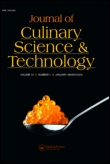
Journal of Culinary Science & Technology
Scope & Guideline
Advancing knowledge in culinary arts and sciences.
Introduction
Aims and Scopes
- Food Product Development:
The journal emphasizes the development and characterization of new food products, including the incorporation of novel ingredients, optimization of recipes, and analysis of sensory and nutritional properties. - Food Safety and Quality Assurance:
Research on food safety protocols, quality assurance measures, and consumer perceptions regarding food safety is a core focus, reflecting the importance of maintaining high standards in culinary practices. - Culinary Techniques and Innovations:
The journal explores innovative cooking techniques and their effects on food properties, including texture, flavor, and nutritional content, contributing to the evolution of culinary practices. - Sustainable Culinary Practices:
An increasing emphasis is placed on sustainability in food production, waste reduction, and the utilization of underutilized ingredients, reflecting a growing concern for environmental impacts in culinary science. - Cultural and Nutritional Aspects of Food:
The journal also delves into the cultural significance of food, dietary habits, and the nutritional implications of various culinary practices, highlighting the intersection of gastronomy and health.
Trending and Emerging
- Plant-Based and Alternative Ingredients:
There is a notable trend towards research on plant-based ingredients and alternative proteins, driven by consumer demand for healthier and sustainable food options. - Functional Foods and Health Benefits:
Increasing publications focus on the development of functional foods that offer health benefits, such as enhanced nutrition and bioactive properties, aligning with global health trends. - Food Technology and Innovation:
Emerging technologies, such as 3D printing in food production and novel preservation techniques, are gaining traction, showcasing the journal's commitment to exploring cutting-edge culinary science. - Consumer Behavior and Culinary Experience:
Research exploring consumer preferences, perceptions, and experiences related to food and culinary practices is on the rise, reflecting an increasing interest in the psychological and social aspects of dining. - Sustainability in Food Systems:
Sustainability has become a key theme, with growing research on sustainable practices in food production and consumption, addressing the environmental impacts of culinary arts.
Declining or Waning
- Traditional Cooking Methods:
Research focusing on traditional cooking methods and their nutritional implications has decreased, possibly due to a growing interest in modern, innovative techniques and the integration of technology in culinary practices. - Regional Culinary Practices:
There appears to be a decline in studies centered around specific regional culinary practices, as the journal shifts towards a more global perspective on food trends and innovations. - Food Pairing and Flavor Combinations:
While flavor pairing remains important, dedicated research on specific food pairing theories has diminished, overshadowed by broader studies on overall culinary innovation and consumer acceptability.
Similar Journals

ITALIAN JOURNAL OF FOOD SCIENCE
Nourishing Minds with Cutting-Edge ResearchITALIAN JOURNAL OF FOOD SCIENCE is a distinguished open-access publication dedicated to advancing knowledge in the field of food science, catering to a global audience of researchers, professionals, and students. Published by Codon Publications in Singapore, this journal, operating under the ISSN 1120-1770 and E-ISSN 2239-5687, has been a vital platform for scholarly discourse since its inception in 1996, converging towards a comprehensive view of food science trends through 2024. With an impressive ranking in the third quartile (Q3) of the Food Science category and a Scopus rank of #151 out of 389, the journal plays a significant role in disseminating high-quality research, contributing to a richer understanding of food science within the agricultural and biological sciences. Since transitioning to open access in 2008, it has further expanded its reach, ensuring that innovative research is accessible to all, thereby fostering collaboration and knowledge exchange in this vital industry.

CZECH JOURNAL OF FOOD SCIENCES
Transforming Food Systems Through Rigorous ResearchCzech Journal of Food Sciences is a premier publication in the field of food science, disseminating vital research since its inception in 1999 and transitioning to Open Access in 2007. Published by the Czech Academy Agricultural Sciences, this journal facilitates the exchange of knowledge among researchers, professionals, and students dedicated to advancing the understanding of food systems, safety, and technology. With an ISSN of 1212-1800 and an E-ISSN of 1805-9317, it holds a respectable position with a Q3 ranking in the Food Science category for 2023, illustrating its commitment to high-quality research despite its Scopus rank of 209 out of 389, situated in the 46th percentile. Located in the heart of the Czech Republic, at TESNOV 17, PRAGUE 117 05, this journal serves as an essential resource for those involved in agricultural and biological sciences, paving the way for innovative discoveries and applications in food science.
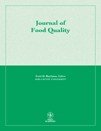
JOURNAL OF FOOD QUALITY
Pioneering Insights for Safer, Higher Quality FoodThe Journal of Food Quality, an esteemed publication under Wiley-Hindawi, stands as a vital resource in the dynamic field of Food Science, established since 1977 and operating under an Open Access model since 2017. With its seat in the United Kingdom, this journal focuses on delivering high-quality research and insights pertaining to food safety, risk management, and quality assurance, reflected in its impressive Q2 ranking in both Food Science and Safety, Risk, Reliability and Quality categories in 2023. Researchers and professionals will find the journal’s contributions indispensable, particularly given its Scopus rankings that place it in the top echelons of its fields, highlighting its impact and relevance. By fostering an environment of knowledge sharing, the Journal of Food Quality not only enhances academic dialogue but also supports innovation and best practices in food research and industry applications.

International Journal of Gastronomy and Food Science
Exploring the Fusion of Culinary Arts and Scientific InquiryThe International Journal of Gastronomy and Food Science, published by ELSEVIER, serves as a premier platform for scholars and practitioners in the domains of gastronomy and food science. With an ISSN of 1878-450X and E-ISSN 1878-4518, this journal has been recognized for its impact, holding a prestigious Q1 ranking in Cultural Studies and a Q2 ranking in Food Science as of 2023, thereby reflecting its influence and relevance in the field. It is particularly noted for its robust Scopus rankings, placing 28th out of 1304 in Social Sciences - Cultural Studies, advocating for high-quality research with a 97th percentile ranking, and 117th in Agricultural and Biological Sciences – Food Science with a 70th percentile ranking. This open-access journal offers a comprehensive exploration of food-related issues, aiming to bridge the gap between culinary arts and scientific research, enhancing the understanding of food systems and cultural significance. For researchers, professionals, and students alike, the International Journal of Gastronomy and Food Science is an invaluable resource, dedicated to fostering innovation and comprehensive discourse in culinary studies.

FOOD TECHNOLOGY
Elevating Standards in Food Safety and ProductionFOOD TECHNOLOGY, published by the Institute of Food Technologists, is a pivotal journal dedicated to the advancement of knowledge and innovation in the food industry. With its ISSN 0015-6639, this esteemed publication aims to bridge the gap between food science research and practical applications, addressing ongoing challenges and technological advancements in food production, preservation, and safety. Although currently not an open-access journal, FOOD TECHNOLOGY continues to serve as a critical resource for food scientists, engineers, and industry professionals seeking to stay at the forefront of emerging trends and research in the field. Recognized for its impact within the academic community, it holds a Q4 ranking in Chemistry, Food Science, and Industrial and Manufacturing Engineering categories, reflecting its importance in disseminating valuable information. Researchers and practitioners alike will find in its pages a wealth of insights that can influence practices and policies in food technology. The journal's editorial team, committed to upholding rigorous standards, ensures that each issue is a thorough representation of high-quality research and a valuable addition to the body of food science literature.
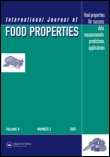
INTERNATIONAL JOURNAL OF FOOD PROPERTIES
Pioneering studies for a sustainable food future.INTERNATIONAL JOURNAL OF FOOD PROPERTIES, published by TAYLOR & FRANCIS INC, is a leading platform for disseminating high-quality research in the field of food science. With an ISSN of 1094-2912 and E-ISSN of 1532-2386, this journal has been committed to open access since 2018, ensuring that groundbreaking studies are readily available to global audiences. The journal has steadily gained recognition for its contribution to the discipline, achieving a Q2 ranking in Food Science and placing in the 68th percentile among its peers according to Scopus metrics. Covering a wide array of topics related to the properties and applications of food, it serves as a valuable resource for researchers, professionals, and students alike. With coverage extending from 1998 to 2024, the journal continually seeks to advance knowledge and foster innovation within the food science community, making it a pivotal publication for anyone serious about this vital field.
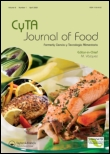
CyTA-Journal of Food
Innovating food technology through cutting-edge research.CyTA-Journal of Food is a prestigious academic journal published by TAYLOR & FRANCIS LTD, dedicated to advancing the field of food science and technology through the dissemination of innovative research and practical knowledge. With an ISSN of 1947-6337 and an E-ISSN of 1947-6345, this journal stands out with its strong impact factor and is currently placed in the Q2 quartile across multiple categories, including Chemical Engineering, Chemistry, and Food Science, making it a vital resource for researchers and professionals alike. The journal has been an integral part of the academic community since its inception in 2009, and continues to publish cutting-edge articles through to 2024. Its alignment with Scopus ranks further signifies its influence, notably achieving 67th percentile in Industrial and Manufacturing Engineering. As an Open Access journal, it ensures widespread accessibility to its valuable content, promoting collaboration and knowledge sharing among scientists, engineers, and students dedicated to enhancing food safety, quality, and sustainability.
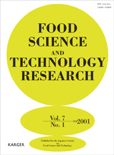
FOOD SCIENCE AND TECHNOLOGY RESEARCH
Driving Progress in Food Science and EngineeringFOOD SCIENCE AND TECHNOLOGY RESEARCH, published by the Japanese Society of Food Science & Technology, is a pivotal journal that encompasses a wide spectrum of research in the fields of food science, biotechnology, and engineering. With its ISSN number 1344-6606 and a digital counterpart E-ISSN 1881-3984, this journal aims to disseminate cutting-edge research and innovative technologies that enhance food safety, quality, and sustainability. Recognized for its contributions, it holds a Q3 category ranking in multiple disciplines, including Food Science and Biotechnology, indicating a significant role in advancing academic discourse. Researchers and professionals can benefit from its insights, as the journal covers an array of topics relevant to industrial applications, marketing strategies, and scientific advancements. Although not an open-access journal, it has a wide reach and is committed to providing high-quality, peer-reviewed content essential for scholars and practitioners in the food science community from 1999 to 2024.
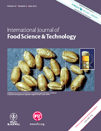
INTERNATIONAL JOURNAL OF FOOD SCIENCE AND TECHNOLOGY
Transforming Knowledge into Culinary InnovationINTERNATIONAL JOURNAL OF FOOD SCIENCE AND TECHNOLOGY, published by WILEY, serves as a premier platform for the dissemination of cutting-edge research in the field of food science and technology. With an ISSN of 0950-5423 and E-ISSN 1365-2621, this journal has been committed to publishing high-quality research since 1966 and is set to continue its impactful contributions through 2024. Recognized for its excellence, it holds a Q1 ranking in Food Science and a Q2 ranking in Industrial and Manufacturing Engineering as of 2023. The journal ranks #95/384 in Industrial and Manufacturing Engineering and #100/389 in Food Science on Scopus, placing it within the top quartiles of these fields. Although it does not currently offer Open Access, researchers and professionals benefit from access to a wealth of knowledge that advances understanding in both applied and theoretical aspects of food science. This journal is indispensable for anyone in the academic and professional domains who seeks to stay abreast of innovations and trends shaping the food industry.

eFood
Advancing food science through innovative research.eFood is a pioneering journal in the field of food science, published by the esteemed WILEY. With its impactful emergence, the journal has rapidly established itself within the academic community, evidenced by its impressive Q1 category ranking in Food Science as of 2023, and a commendable position at Rank #95 out of 389 in the Scopus database. Covering a wide spectrum of topics related to food innovation, technology, safety, and nutrition, eFood serves as an indispensable platform for researchers, industry professionals, and students who are at the forefront of advancing our understanding of food systems. The journal notably operates with an open-access model, promoting wide dissemination of knowledge while enhancing the visibility of high-quality research. As we look forward to converging years from 2020 to 2024, eFood is poised to foster rigorous scientific discourse and contribute significantly to the future of food science research.